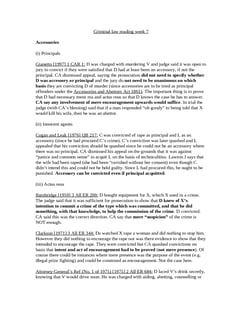Judgement for the case R v Smith
Table Of Contents
KEY POINTS
Criminal Law governs behavior harmful to society, defining offenses, procedures, and penalties. Evidence, including testimonies and documents, is crucial in legal proceedings, with admissibility determined by established rules.
-
Confession, a significant aspect, must be voluntary. Inducement leading to an involuntary confession renders it inadmissible.
Private soldier confessions to a sergeant-major raise questions about admissibility, focusing on voluntariness and inducement.
Subsequent confessions after police caution underwent scrutiny to assess voluntariness. Determining if the original inducement is spent involves evaluating whether factors leading to a confession have changed.
Homicide involves unlawfully causing death. Causation is essential, linking the defendant's actions to the victim's death. Incorrect treatment before death complicates causation, raising questions about external factors.
A break in the chain of causation, interruptions or events severing the link between actions and harm, is crucial in criminal law. Assessing whether a break occurred is vital in establishing criminal liability for actions leading to death.
FACTS
-
Thomas Joseph Smith ("Appellant"), a private soldier, faced charges of murdering another soldier by stabbing during a barrack-room fight.
Following the altercation, the regimental sergeant-major assembled the company, indicating that they would not be released until the individuals involved were identified.
During this parade, the Appellant confessed to the stabbing in a statement to the sergeant-major, which was admitted as evidence during the trial.
The Appellant made another confession the next day to a sergeant of the Special Investigation Branch after receiving a caution.
-
The deceased soldier suffered two bayonet wounds during the fight, with one piercing the lung and causing hemorrhage.
While being transported to the medical reception station, the deceased was dropped twice.
At the reception station, it was revealed that the treatment administered was incorrect.
The Appellant was convicted, and the appeal raised concerns, including the alleged wrongful admission of confessions as evidence and a lack of proper direction from the court regarding causation.
The case involves a complex interplay of events, ranging from the initial fight to the subsequent confessions and issues related to the deceased's treatment, forming the basis of the Appellant's appeal.
JUDGEMENT
-
In the judgment, it was held that the confession obtained by the regimental sergeant major was tainted by threat or inducement, rendering it inadmissible.
The court further determined that if the threat or promise influencing the first statement persisted when the second statement was made, then the latter was also inadmissible.
However, a crucial condition for the admissibility of the second statement was if the time between the two statements, the existing circumstances, and the caution given dissipated the original threat or inducement.
In this particular case, it was concluded that the effect of the original inducement had dissipated, making the second statement admissible as a voluntary statement.
-
The judgment held that at the time of death, the original wound remained an operating and substantial cause, allowing death to be properly attributed to the wound.
Despite the presence of some other contributing cause, the court deemed the original wound as a significant factor leading to the fatal outcome.
COMMENTARY
Criminal Law defines offenses, procedures, and penalties, with evidence playing a good role.
Confessions must be voluntary, and inducement makes them inadmissible.
In the case of Thomas Joseph Smith, a private soldier charged with murder, concerns arose about confessions given to a sergeant-major and subsequent confession after caution.
-
The judgment ruled the first confession inadmissible but deemed the second admissible.
It affirmed the original wound as a substantial cause of death, highlighting the complexities in criminal law, from admissibility challenges to causation considerations.
For Further Study on R v Smith
Need instant answers? Our AI exam tutor is here to help.
Ask questions 🙋 Get answers 📔 It's simple 👁️👄👁️
Our AI is educated by the highest scoring students across all subjects and schools. Join hundreds of your peers today.
Get StartedRelated Product Samples
These product samples contain the same concepts we cover in this case.
| Criminal Law | Homicide Notes (20 pages) |

